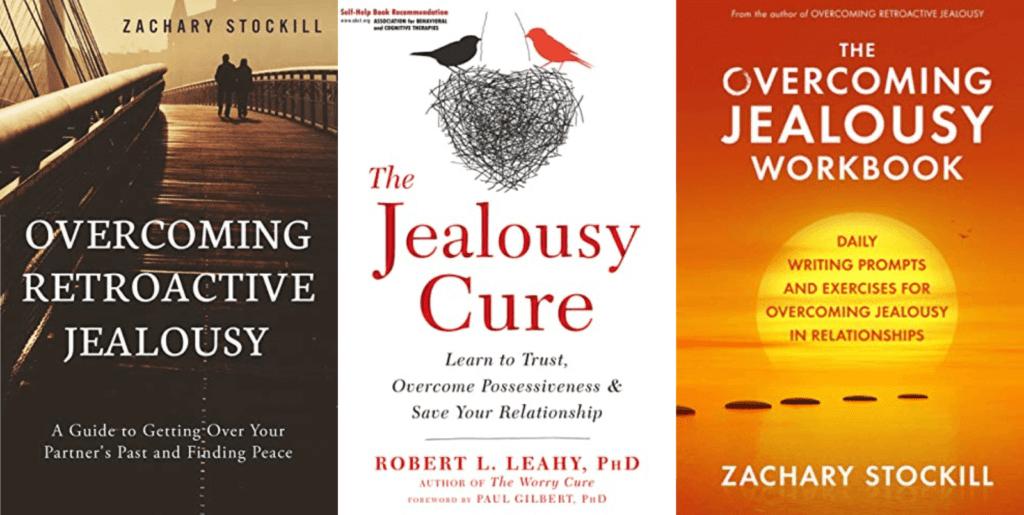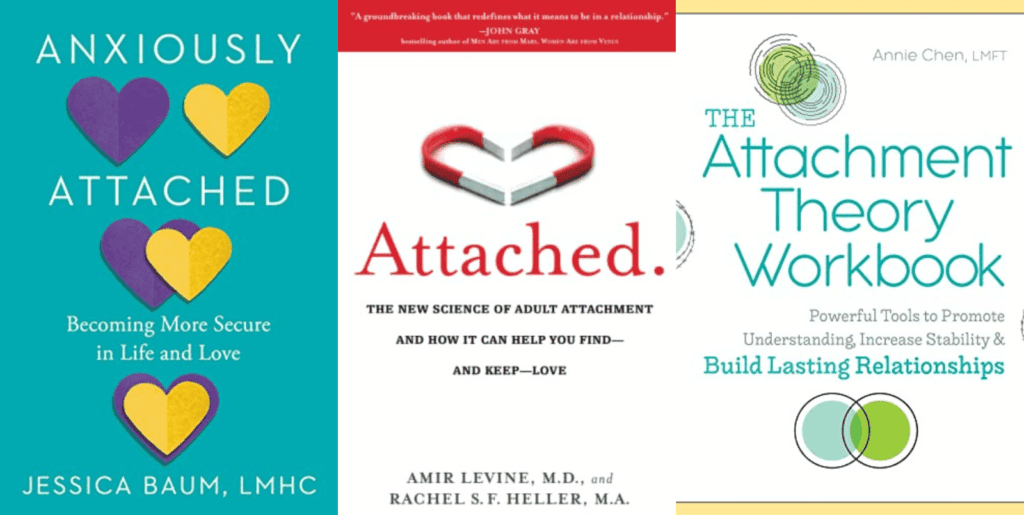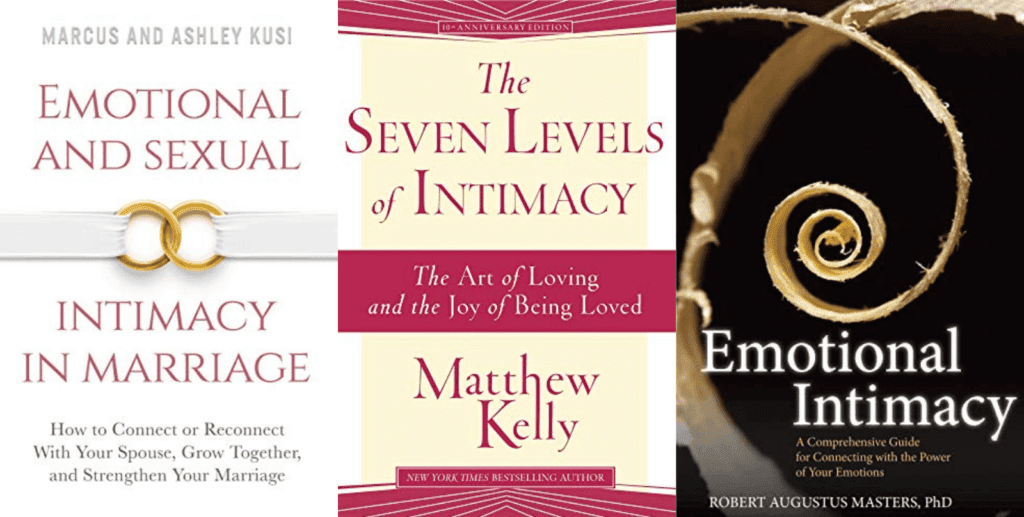The following are books about jealousy in a relationship to help you enjoy healthier relationships.
Disclosure: Some of the links below are affiliate links. This means that, at zero cost to you, I will earn an affiliate commission if you click through the link and finalize a purchase.
Signs of Jealousy
Jealousy can be particularly challenging within a romantic relationship, as it can often lead to conflict and strain. Here are some signs that may indicate jealousy within a relationship:
1. Excessive Monitoring
A jealous partner may excessively monitor their significant other’s activities, such as checking their phone or social media accounts without permission, tracking their whereabouts, or questioning their interactions with others.
2. Possessiveness
Jealousy can result in possessive behaviors, with one partner feeling the need to assert control over the other’s time, actions, or relationships.
They may exhibit signs of distrust or become overly protective.
3. Accusations and Interrogation
A jealous partner may frequently accuse their significant other of infidelity or being interested in someone else.
They may engage in constant questioning, seeking reassurance and demanding detailed explanations for their partner’s actions.
4. Constant Comparison
Individuals who are jealous within a relationship may consistently compare themselves to others, including past or potential romantic interests of their partner.
They may feel threatened by perceived competition.
5. Emotional Volatility
Jealousy often leads to heightened emotional reactions.
A jealous partner may experience mood swings, becoming irritable, angry, or even aggressive when triggered by situations or perceived threats.
6. Isolation and Control
Jealousy can contribute to a desire to isolate one’s partner from friends, family, or social activities.
A jealous partner may attempt to limit their significant other’s interactions or manipulate situations to ensure they are the primary focus of their attention.
7. Low Self-esteem and Insecurity
Underlying jealousy is often rooted in feelings of low self-esteem and insecurity.
A jealous partner may doubt their own worthiness, leading to a constant fear of being replaced or abandoned.
Best 5 Books About Jealousy In A Relationship

1. The Jealousy Cure
By Robert L. Leahy PhD
In this compelling book, you’ll uncover the evolutionary origins of jealousy, and how and why it’s served to help us as a species.
You’ll also learn practices based in emotional schema theory, cognitive behavioral therapy (CBT), acceptance and commitment therapy (ACT), and mindfulness to help you overcome the shame jealousy can bring, improve communication with your partner, and ultimately make room for jealousy while also making your relationship more meaningful.

2. Overcoming Retroactive Jealousy
By Zachary Stockill
In this book, you’ll:
• have access to a multi-step program that will help you to let go of your jealousy and anxiety
• begin incorporating coping exercises into your daily routine which will eliminate your jealous thoughts as soon as they appear
• feel a new sense of optimism and confidence in your ability to grow and overcome retroactive jealousy
• understand what your jealousy is really about, and have a concrete plan of action for overcoming it, and moving forward
Related: Retroactive Jealousy Test (+Top 9 Tips On How To Deal With Retroactive Jealousy?)

3. The Ultimate Retroactive Jealousy Cure
By Jeff Billings
In this book, you will:
- Discover just what a retroactive jealousy disorder is.
- Change how you’re thinking about your partner’s sexual history and rewire these thoughts to reframe them in a much more positive light.
- Overcome your anxiety through four hands-on practical exercises that you can do every day.
Related: Top 15 Journal Prompts For Jealousy

4. Relationship OCD
By Sheva Rajaee
Relationship OCD offers an evidence-based, cognitive behavioral approach to finding relief from relationship anxiety, obsessive doubt, and fear of commitment.
You’ll learn to challenge the often-distorted thought patterns that trigger harmful emotions, increase your ability to think rationally, and ultimately accept the presence of intrusive thinking while maintaining the values of a healthy relationship.
Related: Is It ROCD Or Am I Not In Love? Top 4 Powerful Ways to Overcome Relationship Anxiety And ROCD
Workbooks About Jealousy In A Relationship

5. The Overcoming Jealousy Workbook
By Zachary Stockill
With the aid of this workbook, you will:
* understand exactly what’s working, and what’s not, in your current relationship* get clear about your main “sticking points” when it comes to your jealousy
* gain perspective on crucial past childhood and dating experiences, and how they relate to your jealousy
* learn new mindfulness and awareness techniques designed to enhance your ability to stay present, and deal with jealousy “triggers”
* act as your own “therapist,” digging deep into your psyche and gaining absolute clarity about who you are and what you need to do to beat jealousy
* get clear about whether or not your jealousy is “rational,” and how you can better trust your partner
* feel a new sense of optimism and possibility about your ability to overcome jealousy and possessiveness
* enjoy a new, healthier relationship, freed from the burden of sexual jealousy and possessiveness
* save and strengthen your relationship with your partner (before it’s too late)
Related: Top 8 Tips On How To Get Past Infidelity Triggers And Build Trust Again (+FREE Worksheets)

How Books About Jealousy In a Relationship Can Help?
Books about jealousy in relationships can be a valuable resource for gaining insight, self-reflection, and learning effective strategies for managing and overcoming jealousy. Here are some ways in which such books can help:
1. Understanding Jealousy
These books provide explanations and psychological perspectives on jealousy, helping you understand its roots, triggers, and effects.
This knowledge can increase self-awareness and empathy for yourself and your partner.
2. Normalizing Feelings
Reading about others’ experiences with jealousy can help validate your own emotions.
It can reassure you that jealousy is a common human experience and that you aren’t alone in facing these challenges within relationships.
Related: Top +100 Journal Prompts For Mental Health [+Free PDF Printable!]
3. Identifying Unhealthy Patterns
Books can help you recognize unhealthy behaviors and patterns associated with jealousy.
By understanding the negative impact of jealousy on relationships, you can start to identify and address these behaviors in yourself and your partner.
4. Developing Communication Skills
Effective communication is essential when dealing with jealousy.
Books often provide practical tips and techniques for expressing feelings, needs, and concerns in a constructive manner.
They can also offer guidance on active listening and empathy-building skills.
5. Building Self-esteem
Jealousy often stems from insecurities and low self-esteem.
Books focused on self-improvement and self-acceptance can help boost your confidence, enhancing your ability to manage jealousy by addressing its underlying causes.
Related: Top 18 Self Esteem Exercises (+FREE CBT For Self-Esteem Worksheets PDF)
6. Learning Coping Strategies
Books offer various coping strategies, such as cognitive restructuring, mindfulness, and relaxation techniques, which can assist in managing jealous thoughts and emotions.
These strategies can help you develop healthier and more adaptive responses to situations that trigger jealousy.
7. Promoting Healthy Relationships
Ultimately, books about jealousy aim to foster healthy relationship dynamics.
By providing guidance on trust-building, setting boundaries, and cultivating open communication, these resources can contribute to the overall growth and well-being of your relationship.
Conclusion
It’s important to remember that occasional feelings of jealousy can arise in relationships, but when jealousy becomes pervasive, controlling, or leads to emotional, psychological, or physical harm, it may be necessary to seek professional help.
Couples therapy or individual therapy can provide a supportive environment for addressing and managing jealousy, enhancing communication, and building healthy relationship dynamics.



